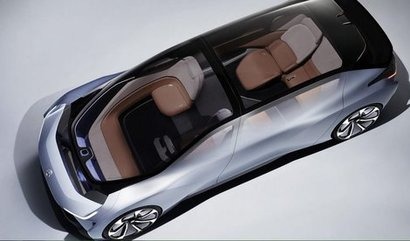
Chinese tech giant Baidu recently confirmed that is has led a financing round in the electric vehicle startup NIO, formerly known as NextEV, which has unveiled its NIO EVE, an embodiment of NIO’s vision for the future of autonomous cars. The company described EVE as a vehicle that “constantly learns about its occupants and their preferences” and that it will be a ‘digital companion’, a ‘robot on wheels’.
Artificial intelligence is at the heart of the EVE concept in the form of NOMI, an AI engine with an intuitive human interface. This will provide verbal and visual connections both within the vehicle and with the outside world. Nomi will use the vehicle’s active glass to provide an augmented vision for occupants and also for new kinds of entertainment.
EVE will utilise optimised door cuts and a wide forward-sliding door. The fixed seats will be designed and positioned to deliver an enhanced feeling of openness while in the primary seating area a discrete folding table provides work or play space. Passengers in the forward two seats will enjoy an enhanced panoramic view, with digital displays on the active glass when needed to support non-autonomous driving.
“We're excited about having autonomous electric cars for U.S. consumers in 2020” said Padmasree Warrior, US CEO of NIO. “Today we also unveiled our vision for the car of the future, focused on delivering unmatched user experience through leading edge, software defined hardware. In 2015, commuters in the U.S. spent over 8 billion hours in their cars commuting. NIO's autonomous electric cars will make your journey safe, productive and enjoyable. Our cars will be your companion and will know your needs, they will be a welcoming living space that moves you. We look forward to producing the first of the next generation of cars for the U.S. consumer.”
NIO, formerly NextEV in the U.S., is a global start-up, designing and developing smart, high-performance, premium electric vehicles. The company employs thousands of world-class R&D and design experts from around the world with significant technology and management background from leading automobile and high tech companies. It was issued an Autonomous Vehicle Testing Permit by the California DMV in October 2016 and intends to begin testing on public roads under the Autonomous Vehicle Tester Programme guidelines as it progresses on its path to bring autonomy to market.
For additional information:

